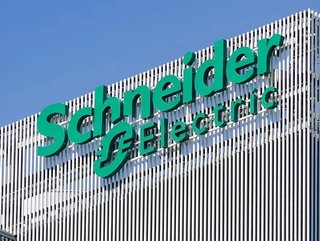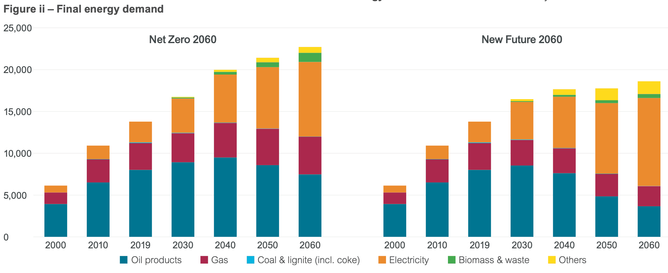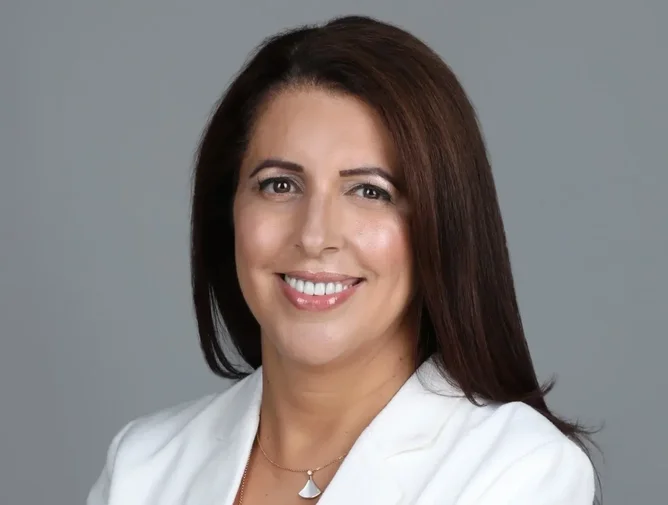Inside Schneider Electric’s Bold Plans for the Middle East

Sustainability may be top of the agenda for many countries and companies, but arguably nowhere does it have as much significance as in the Middle East.
The region is undergoing massive transformation in economic and ESG efforts, as it looks to diversify away from dependence on oil.
Regional governments have taken significant steps in the journey to net zero with the UAE pledging net-zero emissions by 2050 and Saudi by 2060.
But is it enough?
The MENA (Middle East and North Africa) region is projected to experience warming at twice the global rate, a recent report from the World Economic Forum and Bain reveals.
With challenges come opportunities – and the region certainly poses plenty.
Home to half of the world’s largest energy producers, as well as multi-billion-dollar sovereign wealth funds like PIF now dedicated to renewable and decarbonisation, the region is ripe for leading a clean energy transformation.
Saudi’s sovereign wealth fund PIF is pouring billions into sustainable-first mega-projects like NEOM, which is net-zero by design, and Red Sea Global – a project that is revolutionising tourism with its regenerative approach.
While oil giants Aramco and ADNOC are pumping investment into lower-carbon fuels and betting on the future of climate tech.
The region has some of the lowest costs for renewable energy in the world – and this is fuelling opportunities in green hydrogen, synthetic fuels, green manufacturing – not to mention, climate technologies.
Schneider Electric looks to New Future Scenario rather than Net Zero
This is the theme of a new report from Schneider Electric, which explores two potential pathways for how the region can transform its energy landscape and decarbonise by 2060 – unlocking significant economic and environmental benefits in the process.
The report, titled Climate Horizons: Opportunities for a Greener World in the Middle East, was produced in collaboration with the Clean Energy Business Council, and considers two scenarios:
Net Zero Scenario
This scenario takes into account the current commitments from several countries of the Gulf region to reach a net zero economy and explores the role that transformations on the demand side of the energy system can play.
New Future Scenario
This assumes a more rapid development of new energy services, accelerated by technology and supportive policymaking. This involved a more ‘radical transformation of the region’s economy’, and its impact on the energy system.
According to Vincent Petit, SVP Climate and Energy Transition Research, Head of the Schneider Electric Sustainability Research Institute, the findings offer “crucial insights into the unique challenges and opportunities associated with the energy transition in the Middle East”.

The report states that the pathway toward net zero must not come at the expense of economic development, but must be a “‘just transition” – something we heard a lot at COP28.
One of the overarching themes of the report is the idea that we need to look at energy transition through a new lens. That’s because most energy transitions have been driven by changes in consumption patterns but the study of energy services is often overlooked in scenarios that focus on energy supply transformations.
Most scenarios assume that energy services remain as they are, so decarbonisation is mainly about developing alternative energy sources.
However, the way we consume energy has changed significantly.
The Schneider Electric report delivered the following key findings:
- Electricity represents 40-55% of final energy demand in both scenarios.
- Policies driven by governments in the region are more supportive of innovations captured in the New Future Scenario which enables a more rapid scaling up of new services and technology.
- Around two thirds of final energy demand comes from three sectors of economic activity: buildings, road mobility, and manufacturing.
- Uncertainty in manufacturing and road mobility plays a significant role in reaching a net zero economy by 2060.
Importantly, the report draws a positive conclusion. It says that as the economy modernises on the back of new technologies, carbon emissions are reduced and the decoupling between emissions and economic wealth accelerates.
Schneider Electric’s Commitment to Energy Transition in the MENA Region
Schneider Electric has a history of delivering digital solutions when it comes to sustainability in the region, and is recognised as a leader in the digital transformation of energy management and automation.
“Schneider Electric’s success in the UAE and the Gulf region has always been driven by its commitment towards people development and will always be at the heart of our growth engine,” says Amel Chadli, Schneider Electric’s Gulf Cluster President.
Chadli was appointed in January 2024 and is tasked with driving innovation and growth across the Gulf region.
Previously, Chadli was the Vice President of Digital Energy and Energy Management Software – Middle East & Africa, leading Schneider Electric’s smart building, healthcare, and microgrid initiatives.

How Schneider Electric Helps McDonald’s Make Happier Meals
Theory and talk is all well and good, but when the chips are down (or fries in this case) how does Schneider Electric deliver on its energy dreams?
In the UAE, Schneider Electric is helping the fast food giant McDonald’s to decarbonise its flagship restaurant of the future with energy saving technologies. This is being rolled out across five existing outlets and 10 new branches set to open across the country.
The pioneering branch in Umm Suqeim2, Dubai, has EV charging points, a smart grid to optimise energy consumption, and a building management system. All of these help the burger giant save up to 20% of its energy usage, and reduce carbon dioxide emissions by up to 30% by harnessing renewable energy.
Producing Hardware for Sustainability Switch in Saudi Arabia
In July 2023, Schneider Electric opened a new production line in Riyadh to manufacture hardware to contribute to Saudi Arabia’s energy and sustainability goals.
The production line will support the Vision 2030 aim of positioning the Kingdom as a global manufacturing hub, increasing opportunities to export energy management solutions to regional and global markets.
In February 2024, the country’s Public Investment Fund (PIF) announced the launch of Alat – a world-class manufacturing hub to empower global companies to set up sustainable manufacturing solutions in Saudi Arabia, powered by clean energy and supported by the Kingdom’s commitment to invested in technology.
Strategic business sectors include semiconductors, smart devices, smart building, smart appliances, smart health, advanced industrials and next-generation infrastructure.
Expect Schneider Electric to be a significant part of that brighter future in the region.
- Schneider Electric is headline sponsor of the upcoming Sustainability LIVE Net Zero event, taking place 6-7 March in London.
*******************
Make sure you check out the latest edition of Sustainability Magazine and also sign up to our global conference series - Sustainability LIVE 2024.
*******************
Sustainability is a BizClik brand.






